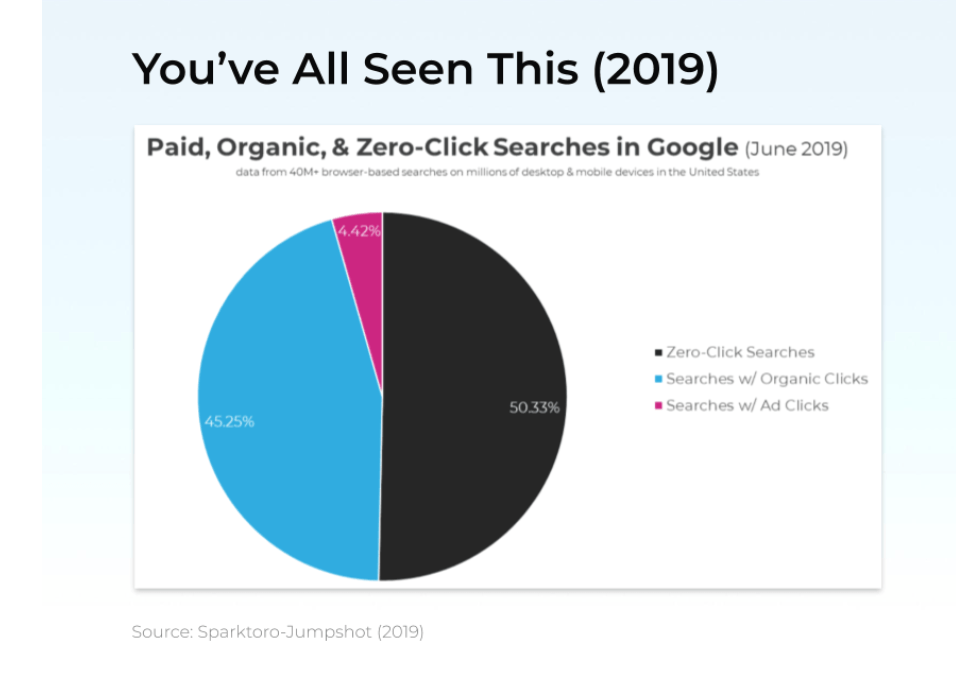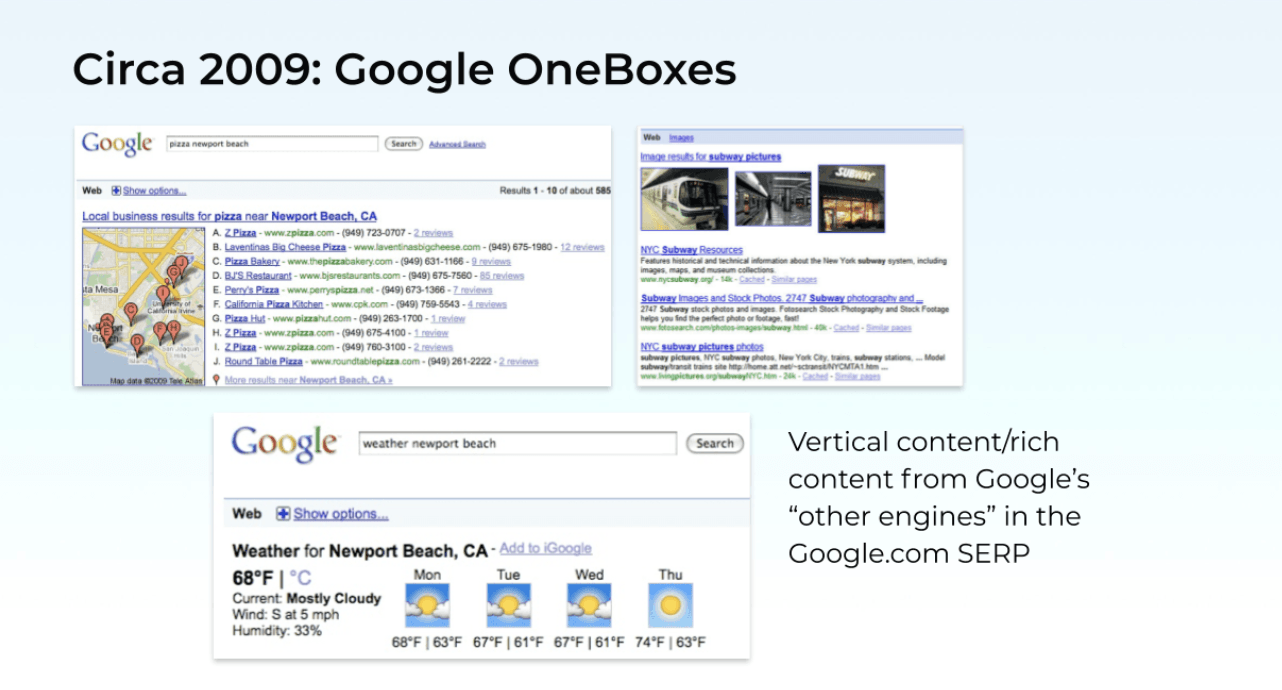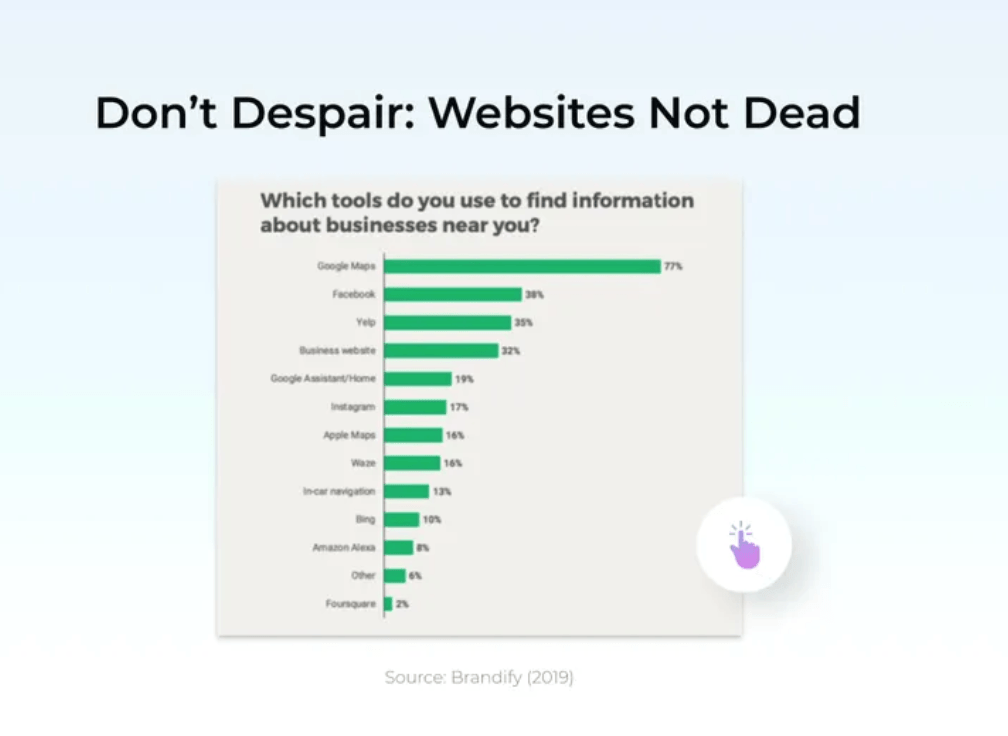How To Beat The Zero-Click SERP
WHAT IS ZERO-CLICK SEARCH?
Zero-click search refers to searches on search engines like Google that do not result in a click to a website because the searcher found the information they were looking for directly on the search engine results page (SERP).
Now, more than 50% of search results don’t result in a click and the number is even higher in mobile.

Google wasn’t the only search engine experimenting with this format either. Every search engine from Yahoo to Ask was experimenting with early versions of what would come to be known as zero-click search. After a decade of this slow march, we have finally arrived in the zero-click world we were all destined to land in.
WHAT DOES ZERO-CLICK MEAN FOR LOCAL SEARCH?
Zero-click has become one of the dominant behaviors in local search. Travel, hospitality, restaurants, services — Google now provides all kinds of information directly in its SERPs related to these industries and often allows users to complete their intended actions without ever exiting the search engine’s environment. As Rand Fishkin of SparkToro noted near the end of 2019, Google has moved from “everyone’s search engine to everyone’s competitor.”New Paragraph
WHAT ARE THE BIGGEST CONCERNS FOR LOCAL SEARCH?
There are six big fears that seem to come up over and over again in the conversation around zero-click searches. They are:
- Google is far too powerful
- It could lead to a loss of traffic and revenue for site owners
- It could lead to a loss of customer data, which is critical for marketing effectively on today's web
- Some companies may experience an erosion of their brand as more and more of their content and relevant information can be found in a Google environment
- Business owners could be compelled to buy ads because of diminished visibility
- Google could put publishers out of business
Some of these concerns may be over blown. For example, Google’s behavior shouldn’t be viewed as a conspiracy to get people to buy more ads. The search engine is simply doing what it thinks is best to meet the needs of users. However, some of these concerns have been found to be warranted and affected certain businesses, like travel brokers, in negative ways.
Google has also added a number of different features over the last year including booking, food ordering, the ability to request a quote and messaging. All of this has been added in order to help users “get stuff done,” but the impact for some has been reminiscent of watching a black hole expanding and sucking up everything it comes into contact with.
HOW TO DO ZERO-CLICK SEO EFFECTIVELY
Though the prevalence of zero-click searches may make it seem like Google will inevitably swallow all web traffic, that’s just not true. According to a 2019 study by Brandify, 32% of users find information about businesses near them by visiting a small business’s website.New Paragraph
And consumers even trust these websites more than Google. According to another 2019 study conducted by BrightLocal, when asked “which source do you expect to have the most accurate and up-to-date contact information?” 56% chose the small business website over Google.
This means that local SEO is not dead due to the emergence of zero-click search, and may in fact be more important than ever.
To optimize for zero-click searches, there are a variety of steps you can take. The following are a few you’ll definitely want to explore. New Paragraph
OPTIMIZE FOR FEATURE SNIPPETS
Click-through rates (CTRs) for queries with featured snippets are slightly higher than they are for queries without according to a study by Perficient Digital earlier this year.
In some cases, the snippet answered the question without a click; in others, it drove substantially higher CTR to the sites from which the featured snippet was derived. Overall, the study concluded featured snippets in the aggregate had a negligible impact on CTR.New Paragraph
FOCUS ON SEARCH INTENT AND LONG-TAIL CONTENT
Search is becoming more conversational and focused on user intent. As Google consistently states, it’s important to create content that addresses the intent of the user. According to Ahrefs, 60.67% of all “search demand” is generated by only 0.16% of the most popular keywords.
The other 39.3% belongs to the 99.8% of queries with one thousand or fewer searches per month — i.e., “long tail” keywords.New Paragraph
OPTIMIZE FOR GOOGLE FEATURES & PROPERTIES
Google’s features and products are in fact very popular with users and it’s a good idea to optimize for them. Here are a few you should focus on:
- Featured snippets
- Schema markup
- Product listing ads (for retailers)
- Popular products (merchant feeds and product schema)
- Images (quality, image types, sitemaps, file types, naming)
- Video that appears in video carousels (YouTube)
OPTIMIZE FOR GOOGLE MY BUSINESS (GMB)
A Google My Business profile is a critical component of obtaining local and zero-click search success. Here’s how to optimize it for the best results.
- Provide a consistent name, address and phone number
- Complete content (e.g. descriptions, attributes)
- Engage with reviews (ask ethically and respond)
- Use lots of high-quality images that communicate details about the business
- Select proper business categories
- Engage in active reputation management
BUILD AWARENESS USING NON-GOOGLE CHANNELS
For the tech-immersed, it can be hard to remember that Google is not the only game in town for building a brand. There are loads of other channels you should be engaging with that will ultimately result in better SEO and zero-click search interactions for your customers.
This includes social media (FB, Instagram, LinkedIn, Twitter, etc.), public relations, traditional media, offline events and the creation of high-quality proprietary content.








